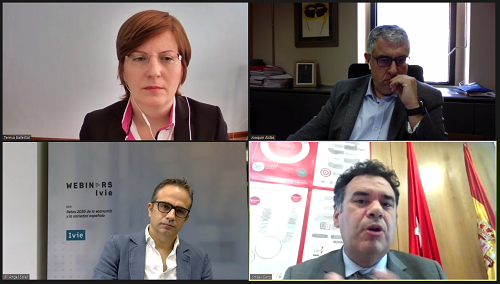News

IvieLAB presents the challenges for education in the face of digitalization and new labor market demands
The Laboratory for the Analysis and Evaluation of Public Policy (IvieLAB), developed by the Ivie in collaboration with the Valencian Regional Government, organized a workshop on the new challenges facing the Spanish education system in the 21st century, with participation by experts Ángel Soler, Ismael Sanz, Joaquín Aldás and María Teresa Ballestar. The aim of the meeting was to discuss the challenges facing education in a changing and increasingly demanding labor market, marked by the use of technology.
The workshop, presented by Ivie’s Managing Director, Pilar Chorén, began with a presentation given by Ángel Soler, Professor at the University of Valencia and Ivie Researcher, who discussed the main results of the report Mapa del abandono educativo en España (Mapping of school dropouts in Spain). Soler highlighted that, although, the dropout rate has decreased in Spain, it still stands at 16%, the second to the last highest in the European Union, only behind Malta.
Ismael Sanz, Vice-Rector for Quality Assurance and Professor of the Department of Applied Economics I at the Rey Juan Carlos University, stressed the importance of transversal competencies, which are increasingly in demand by companies. He also insisted on the need for “education to converge with the current technological level in order to prepare students for the digital revolution”.
Thirdly, Joaquín Aldás, Professor of Marketing and Market Research at the University of Valencia and Ivie Research Professor, focused his presentation on university education and warned of the decrease in STEM (science, technology, engineering and mathematics) graduates, which are increasingly in demand.
Finally, María Teresa Ballestar, Professor at the Rey Juan Carlos University, closed the workshop with an analysis of the impact of robotization on education and employment, explaining that robotization contributes to increasing and improving working conditions in companies that make use of it.

